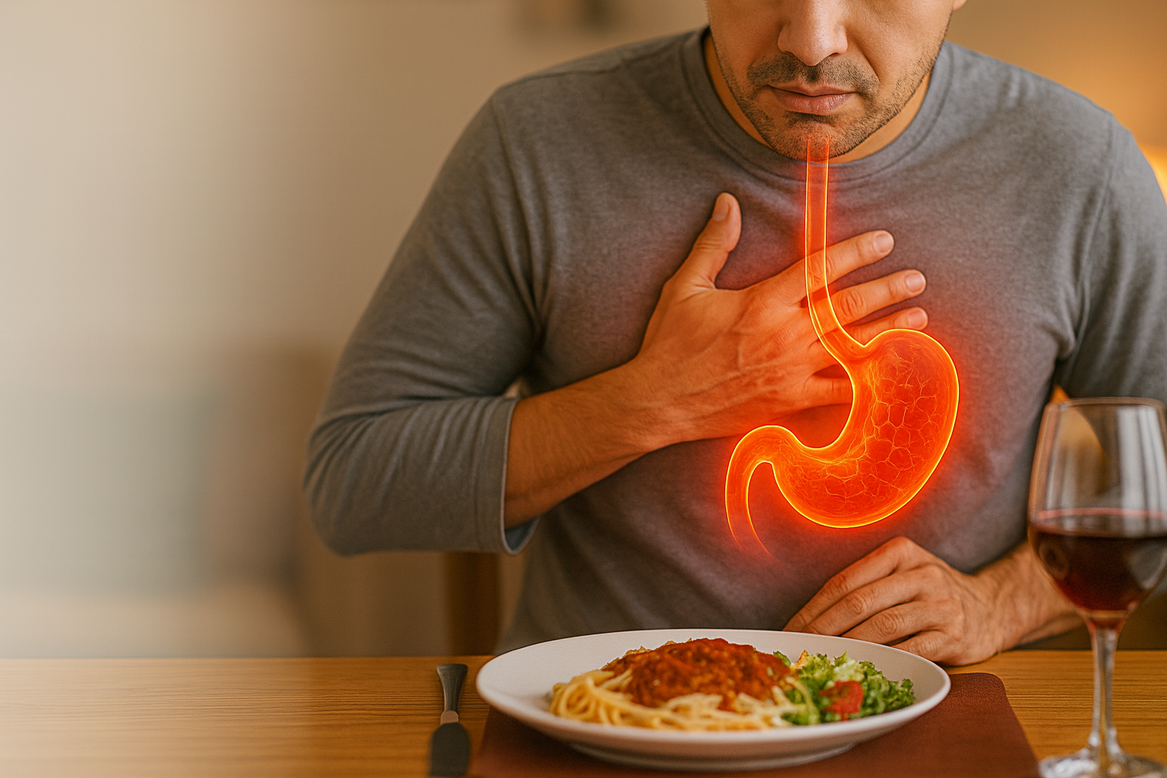Acid Reflux & Indigestion
Digestive Health
At SwiftMedi, we know how uncomfortable acid reflux and indigestion can be - from burning chest pain and bloating to that constant “lump in the throat” feeling. The right treatment can make a real difference, bringing fast relief and helping you enjoy food and daily life without discomfort.

About Acid reflux & Indigestion
Overview
Acid reflux and heartburn are among the most common digestive problems in the UK — and if you’ve ever felt that burning, uncomfortable sensation in your chest or throat after eating, you’re not alone. For many people, it’s an occasional irritation after a heavy meal, but for others, frequent reflux can disturb sleep, affect confidence around food, and make everyday life feel harder than it should.
Heartburn happens when stomach acid flows back into the food pipe (oesophagus). While almost everyone experiences it at some point, ongoing or severe symptoms may signal a condition called gastro-oesophageal reflux disease (GORD), which can have a bigger impact on wellbeing if left untreated.
The reassuring news is that help is available — and it really can make a difference. With the right approach, most people find their symptoms ease dramatically. From simple lifestyle changes to proven medicines such as proton pump inhibitors (PPIs), effective relief is within reach. At SwiftMedi, every request for treatment is carefully reviewed by a UK-registered prescriber through a secure online consultation, ensuring that you get safe, professional, and discreet care tailored to your needs.
Symptoms
The most common symptoms of acid reflux and heartburn include:
- Burning sensation in the chest or throat, especially after eating or when lying down
- Sour or bitter taste in the mouth
- Regurgitation of food or liquid
- Bloating or belching
- Hoarseness, sore throat, or cough (often worse at night)
Less common but more serious symptoms may include:
- Difficulty swallowing (dysphagia)
- Chest pain unrelated to exercise
- Unexplained weight loss
- Frequent vomiting or black stools (seek medical help urgently)
Diagnosis
Most cases of acid reflux and heartburn can be diagnosed based on symptoms alone. A GP may investigate further if:
- Symptoms are persistent or severe
- Lifestyle changes and over-the-counter treatments haven’t helped
- There are “red flag” symptoms (difficulty swallowing, unexplained weight loss, vomiting blood, black stools)
- Tests may include endoscopy, pH monitoring, or imaging if GORD or complications are suspected.
Treatments
Effective relief often comes from a combination of lifestyle changes and medication.
Lifestyle Approaches
- Eating smaller meals and avoiding late-night eating
- Cutting back on spicy, fatty, or acidic foods
- Losing weight if overweight
- Raising the head of the bed at night
- Avoiding smoking and reducing alcohol
Medical Treatments
- Antacids (fast but short-term relief)
- Alginates (form a barrier to reduce acid irritation)
- H2 blockers (reduce acid production, e.g., ranitidine alternatives)
- Proton Pump Inhibitors (PPIs) (effective longer-term relief, e.g., omeprazole, lansoprazole, esomeprazole, pantoprazole)
At SwiftMedi, our prescribers can safely recommend and supply clinically proven treatments such as omeprazole, lansoprazole, and other PPIs after a secure online consultation.
Prevention
Many people can reduce the frequency of reflux by making small changes:
- Avoid eating just before bedtime
- Maintain a healthy weight
- Identify and reduce personal “trigger” foods
- Reduce stress where possible
- Avoid tight clothing around the stomach
Misconceptions
“Heartburn is the same as a heart problem.”
Not true — while both cause chest pain, heartburn is digestive, not cardiac. However, if chest pain is severe or linked to exertion, seek urgent medical help.
“Only unhealthy diets cause reflux.”
Even people with balanced diets can experience acid reflux due to factors like stress, body weight, or pregnancy.
“You just have to live with it.”
Effective treatments are available — from lifestyle adjustments to safe, proven medicines. You don’t have to suffer in silence.
FAQ
Is acid reflux dangerous?
Occasional reflux is not harmful, but frequent symptoms may damage the oesophagus and should be treated.
Can lifestyle changes really make a difference?
Yes — simple changes such as eating smaller meals, losing weight, and avoiding trigger foods can significantly reduce symptoms.
What’s the difference between acid reflux and GORD?
GORD (gastro-oesophageal reflux disease) is diagnosed when reflux is frequent, severe, or causing complications.
How quickly do PPIs like omeprazole work?
Some people feel relief within a few days, but it may take up to 2 weeks for full benefit.
Can I take reflux medicines long term?
PPIs are safe for most people short-term. Long-term use should be reviewed by a healthcare professional.
Is heartburn common in pregnancy?
Yes — hormonal changes and pressure on the stomach often trigger reflux in pregnancy. Suitable treatments are available under medical guidance.